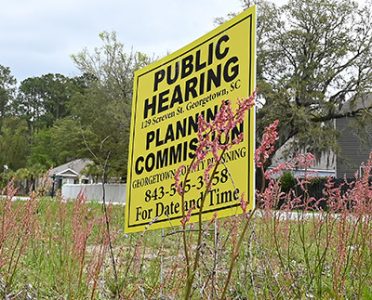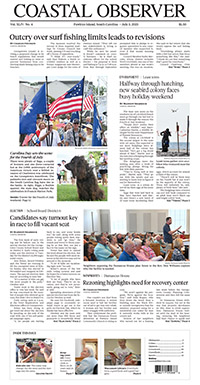Land use
Ordinance change seen as threat to public input

Faced with complaints that it was stifling public input, Georgetown County last week delayed action on a change to the way it reviews plans for multi-family developments. Although critics say the current process violates state law, they told the Planning Commission that the proposed fix will create other problems.
It would “hamper the ability of the public to oversee and participate in effective land use planning and zoning,” said Duane Draper, who chairs the citizens group Keep It Green, which is one of the plaintiffs in four lawsuits challenging county land-use decisions.
At issue is a process called site plan review. Until 2008, applications for multi-family development on property that was already zoned for that use were reviewed by the planning staff, just like single-family developments and commercial projects.
That was changed to require multi-family projects with more than 10 units to seek “planned development” zoning, which requires a public hearing by the Planning Commission and approval from County Council. The goal was to provide more public notice of multi-family projects before construction started.
After the state Supreme Court ruled that planned developments must contain a mix of residential and commercial uses, the county revised the process to require that those multi-family plans be reviewed by the commission, subject to a public hearing and approved by the council. Because the review doesn’t involve a zoning change, the county says that review is limited to compliance with existing regulations.
Keep It Green and other groups challenging the approval of three multi-family developments, say those should have been denied because the future land use maps that are part of the county’s comprehensive plan show the property as “medium density” of no more than five units an acre. The zoning ordinance allows higher density, and the county says that its the controlling factor.
Cindy Person, chief counsel for Keep It Green Advocacy, argues that the current process is also illegal because state law gives the authority for site plan approval to the Planning Commission or its designee, not County Council.
“Site plan review is appropriate for staff if the underlying zoning is in compliance with state law in the first place,” Person told the commission last week. “In Georgetown County, a great deal of ‘general residential’ zoning is out of sync with the comprehensive plan. The proposed amendment does not address the problem.”
While the dispute over the primacy of the zoning ordinance and the comprehensive plan is pending in court, residents who oppose multi-family developments in their neighborhood continue to be frustrated when they receive approval from the county. County Council members have said in the past that site plan review raises unrealistic expectations that projects can be denied.
Johnny Ford, who created the Parkersville Planning and Development Alliance, to oppose multi-family projects in the area, thinks that opposition has prompted the county to change the rules.
“It amazes us how County Council don’t hear our voices,” Ford said. “It would be a travesty to go forward with this proposal.”
William Cooper, a Pawleys Island area resident, cited the state’s Freedom of Information Act and told the commission that the proposal goes against the idea of open government.
In addition to shifting the review of multi-family projects to the planning staff, the proposal would also add new requirements for those projects. They would have to create a landscaped buffer between neighboring property, provide land for sidewalks or bike paths and maintain at least 15 percent of the property – after deducting space for infrastructure – as open space.
The public would still get notice when those projects apply for county approval, said Holly Richardson, the planning director. The notifications would go to all property owners within 600 feet, an increase from the 400-foot radius for current notifications.
The public can review the plans and submit comments to the staff. And Richardson stressed that the process would only apply when multi-family use was permitted by the existing zoning.
“Multi-family projects obviously create a great deal of concern,” she said.
Commission member Marla Hamby questioned why the change was being proposed now.
“I hope it’s my imagination gone wild,” she said, but it looks like an effort to stifle public input.
Hamby would prefer to keep the commission in the process, but eliminate County Council approval.
In that case, Person said, the ordinance needs to be more specific about the time period for notice and comment and about the appeals process.
Under state law, staff decisions can be appealed to the commission. If the commission makes the decision, the appeal is to Circuit Court.
The commission voted unanimously to defer a vote so they could hold a workshop on the proposal.
County Council Member Bob Anderson told the county Republican Club this week he also met with staff about the site plan review last week.
“I want the public involved,” he said. “We’ve got to let the people in this county know what the hell’s going on.”




